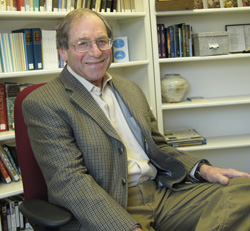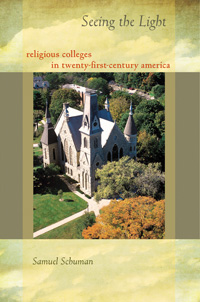Book highlights Cornell as church-related college
MOUNT VERNON – A new book examining the place of religious colleges and universities in contemporary American higher education highlights Cornell College as a church-related institution that is distinct from both religious and secular colleges.
 “Seeing the Light: Religious Colleges in Twenty-First Century America,” by Samuel Schuman, was published this month by The Johns Hopkins University Press.
“Seeing the Light: Religious Colleges in Twenty-First Century America,” by Samuel Schuman, was published this month by The Johns Hopkins University Press.
“I argue that Cornell College may seem to some purists to have lost its religious base, but that to me, it has retained it in an evolved state — that its history and culture have not led it to a point where it is identical with a secular school such as a branch of a state university,” Schuman said.
 Cornell College was founded by Methodist minister George Bowman in 1853 and remains a United Methodist-related college with a chaplain who provides spiritual life offerings in and beyond Christianity. Although it doesn’t require chapel services or religion classes, through optional coursework and programming Cornell allows its diverse student body to define spirituality in ways that best resonate with them.
Cornell College was founded by Methodist minister George Bowman in 1853 and remains a United Methodist-related college with a chaplain who provides spiritual life offerings in and beyond Christianity. Although it doesn’t require chapel services or religion classes, through optional coursework and programming Cornell allows its diverse student body to define spirituality in ways that best resonate with them.
“Like college students nationwide, Cornell students have a high degree of interest in spirituality,” said Cornell Chaplain Catherine Quehl-Engel. “Cornell values this diversity as part of the educational experience and strives to build an authentic caring community, mutual appreciation, and respect as we live together amid our religious, cultural, political and other differences.”
In the book, said former college chaplain and Cornell Professor Emeritus of History The Rev. Richard Thomas, “Sam Schuman is saying that Cornell College has found an original and creative solution to secularization.”
According to “Seeing the Light,” many religious schools are flourishing and have rigorous academic standards, impressive student recruitment, ambitious philanthropic goals, and well-maintained campuses and facilities. Yet much of the U.S. higher-education community ignores them or accords them little respect. “Seeing the Light” considers what can be learned from the viability of these institutions.
The book features an aerial photo of Cornell’s King Chapel on the cover. Cornell is also mentioned in Schuman’s 2005 book, “Old Main: Small Colleges in Twenty-First Century America.”
Schuman taught English at Cornell from 1970-77. He is retired as chancellor of the University of Minnesota-Morris, a public liberal arts college where he also served as dean of the college.
Book highlights Cornell as church-related college
MOUNT VERNON – A new book examining the place of religious colleges and universities in contemporary American higher education highlights Cornell College as a church-related institution that is distinct from both religious and secular colleges.
“Seeing the Light: Religious Colleges in Twenty-First Century America,” by Samuel Schuman, was published this month by The Johns Hopkins University Press.
“I argue that Cornell College may seem to some purists to have lost its religious base, but that to me, it has retained it in an evolved state — that its history and culture have not led it to a point where it is identical with a secular school such as a branch of a state university,” Schuman said.
Cornell College was founded by Methodist minister George Bowman in 1853 and remains a United Methodist-related college with a chaplain who provides spiritual life offerings in and beyond Christianity. Although it doesn’t require chapel services or religion classes, through optional coursework and programming Cornell allows its diverse student body to define spirituality in ways that best resonate with them.
“Like college students nationwide, Cornell students have a high degree of interest in spirituality,” said Cornell Chaplain Catherine Quehl-Engel. “Cornell values this diversity as part of the educational experience and strives to build an authentic caring community, mutual appreciation, and respect as we live together amid our religious, cultural, political and other differences.”
In the book, said former college chaplain and Cornell Professor Emeritus of History The Rev. Richard Thomas, “Sam Schuman is saying that Cornell College has found an original and creative solution to secularization.”
According to “Seeing the Light,” many religious schools are flourishing and have rigorous academic standards, impressive student recruitment, ambitious philanthropic goals, and well-maintained campuses and facilities. Yet much of the U.S. higher-education community ignores them or accords them little respect. “Seeing the Light” considers what can be learned from the viability of these institutions.
The book features an aerial photo of Cornell’s King Chapel on the cover. Cornell is also mentioned in Schuman’s 2005 book, “Old Main: Small Colleges in Twenty-First Century America.”
Schuman taught English at Cornell from 1970-77. He is retired as chancellor of the University of Minnesota-Morris, a public liberal arts college where he also served as dean of the college.



